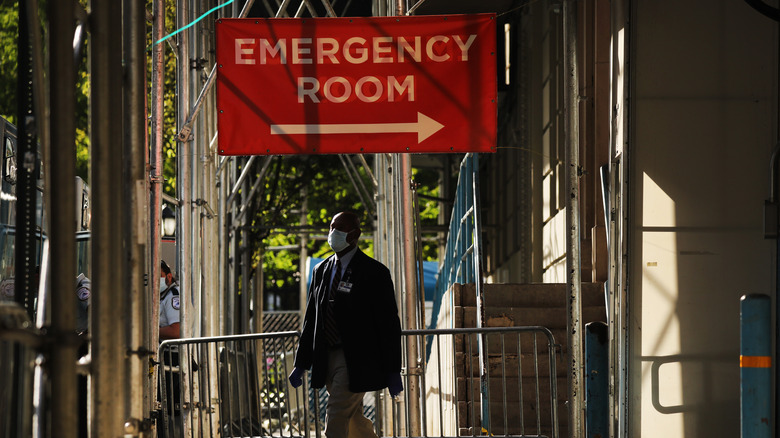Emergency Medicine Specialist Dr. Jay Baruch Explains How To Advocate For Yourself In The ER - Exclusive
Going to the emergency room is never a pleasant experience, but Dr. Jay Baruch, who's been working in emergency medicine for nearly thirty years, says there are ways to make your visit better. Dr. Baruch has discovered that the most crucial aspect of a successful trip to the emergency department is the communication between the patient, the nurses, and the doctors.
Unfortunately, the emergency department doesn't exactly foster clear communication. People who show up to receive care are sick or in pain, and often don't know what information the doctors and nurses need to know. The nurses and doctors are rushing from case to case, trying to provide the best care possible while managing the chaos inherent in emergency medicine. Patients who are desperately seeking answers and relief are understandably dealing with frayed nerves, especially if they've been waiting a long time to be seen, which is often the case.
Dr. Baruch's decades of experience have taught him that there are some simple ways that patients can advocate for themselves and open up the lines of communication. In an exclusive interview with Health Digest, he shared some ways to make your next trip to the ER go a little smoother.
Tell your story
Early on in his career in the emergency room, Baruch realized that his patients weren't just giving him information, they were telling him their story. As he continued to practice, he found that the key to determining the proper treatment for any particular patient was actively listening to their whole story, not just the details they gave about their symptoms.
"I can't care for patients unless I care for their stories," Dr. Baruch insisted. "I get a better sense of their troubles, fears, hopes, etc. through stories... Sometimes, most important is what's left out, and I have to be savvy [about] the gaps in their stories. The rush to find an answer is often premature... Sometimes patients aren't seeking a diagnosis but comfort or having someone tell them they're doing an excellent job under pressing circumstances. Sometimes, a chest pain complaint is an excuse to stay off the streets for a night. Listening means being able to read between the lines."
He went on to say that it's crucial for patients to be willing to tell the whole story of their illness, even the things they don't think are important. Since they're not doctors, they don't know what might be important or not, so it's better to give the doctor everything than leave something out.
'Don't be afraid to speak up'
Dr. Baruch added that the most powerful tool patients have when they show up at the ER is their voice. If patients don't think they're getting the care they need, the nurses and doctors genuinely do want to know that.
"If you're waiting a long time, and you're in pain or not looking well, then respectfully talk to the staff," he said. "Speak up or find us if there are bits of information you feel we should know. Most important, be an advocate. Don't be afraid to speak up... Please tell us if you're waiting and you're not feeling well. Please tell us if you feel you've been forgotten. Please share with us any change in your condition. Please remind us if you're waiting for lab or diagnostic imaging results. If you don't understand something, ask us to explain it again. I can't emphasize this enough."
He added that though it's easy to get frustrated with the ER staff when you're in pain or feeling really ill, it's important to remember that the staff is doing the best they can, and they're often navigating extremely difficult circumstances. If patients can remember that the staff is "on your side" and communicate respectfully, everything goes smoother.
Dr. Baruch's new book, "Tornado of Life: A Doctor's Journey through Constraints and Creativity in the ER," is now available.



